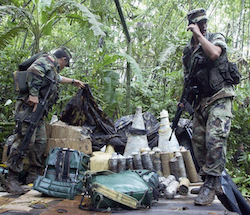Recent reports suggest that dissident members of Colombia’s main guerrilla group have begun forming new criminal structures in Ecuador, raising the possibility that others could follow in their footsteps as the group’s leadership finalizes a peace deal with the Colombian government.
Residents and officials in the department of Sucumbíos on Ecuador’s eastern border with Colombia have been warning about the rise of new armed groups in that area, possibly consisting of defectors from the Revolutionary Armed Forces of Colombia (Fuerzas Armadas Revolucionarias de Colombia – FARC).
On August 9, the Ecuadoran news outlet El Comercio published an article based on an interview with a Sucumbíos resident referred to as Víctor M., who said he was kidnapped in late June and held by one such group for 20 days.
According to El Comercio, shortly after Víctor’s release police arrested nine suspects in the kidnapping, seven of whom were Colombian citizens. The news outlet reported that local military intelligence officials confirmed that FARC defectors were among the group’s members.
The July 29 bombing of a store in the town of Puerto El Carmen de Putumayo also rattled local residents, although no one was injured in the attack. The shop owner told El Universal that the bombing was a reprisal for refusing to pay extortion fees to an armed group calling themselves “M.R.A. Comuneros del Ecuador.”
El Universal reports that local residents have observed the presence of FARC members in that area for years, but never before had they experienced attacks like the recent bombing.
InSight Crime Analysis
These preliminary reports suggest that FARC members in western Colombia could be abandoning the guerrilla group to pursue illegal activities that fighters would be expected to give up in the event of a peace agreement with the Colombian government. Members of at least one FARC faction — the 1st Front of the Eastern Bloc — have openly stated that they would not go along with the peace process. And based on extensive field research, InSight Crime estimates that up to 30 percent of the FARC’s fighters could defect from a possible accord.
SEE ALSO: Coverage of the FARC Peace Process
Eastern Ecuador is an attractive location for would-be criminal defectors, as the FARC has long been involved in coca production in that area, selling the yield to Colombian criminal groups known as “bandas criminales,” or BACRIM, or even Mexican groups like the Sinaloa Cartel. The Ecuadoran government has previously expressed concern that the peace agreement could lead to a proliferation of criminal activity in that country by dissenting FARC members, leading authorities there to ramp up security operations in border areas in recent months.

